小学英语现在完成时
(最新版)小学英语语法八大时态总结
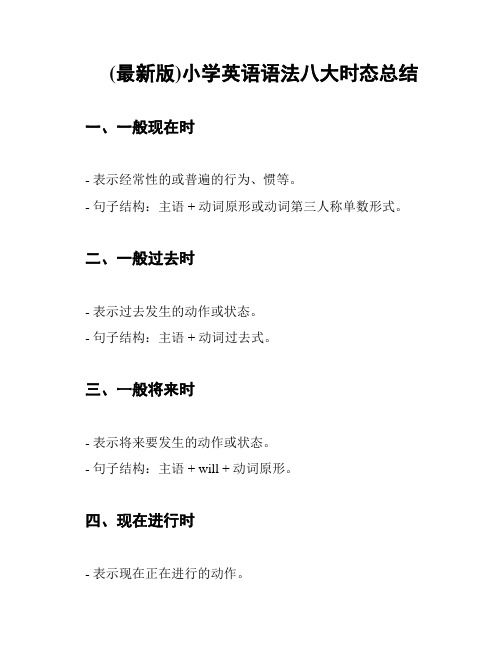
(最新版)小学英语语法八大时态总结一、一般现在时
- 表示经常性的或普遍的行为、惯等。
- 句子结构:主语 + 动词原形或动词第三人称单数形式。
二、一般过去时
- 表示过去发生的动作或状态。
- 句子结构:主语 + 动词过去式。
三、一般将来时
- 表示将来要发生的动作或状态。
- 句子结构:主语 + will + 动词原形。
四、现在进行时
- 表示现在正在进行的动作。
- 句子结构:主语 + am/is/are + 动词-ing。
五、过去进行时
- 表示过去某个时间正在进行的动作。
- 句子结构:主语 + was/were + 动词-ing。
六、将来进行时
- 表示将来某个时间正在进行的动作。
- 句子结构:主语 + will be + 动词-ing。
七、现在完成时
- 表示过去发生但与现在有关的动作或经历。
- 句子结构:主语 + have/has + 动词过去分词。
八、过去完成时
- 表示过去某个时间之前已经发生的动作。
- 句子结构:主语 + had + 动词过去分词。
以上是小学英语语法八大时态的总结,希望能对同学们的研究有所帮助。
小学英语考试中“现在完成时”时态问题的解析

KAOSHI YUPINGJIA◎福建省泉州东海湾实验学校杨玉芳时态包括两部分,即“时间+状态”,时间指“发生动作的时间”;状态指“发生动作的状态”。
小学阶段初步接触现在完成时,主要结构是have /has done ,需要将学生放在实际语境中分析理解这一时态。
实际上,现在完成时是时态语法中的一个“分水岭”,是在一般现在时与一般过去时的基础上难度更高一层的时态知识。
教师在教授现在完成时知识的时候要做好区分,同时使用适合的策略帮助学生更好地理解文本的结构、用法与标志,旨在让学生了解现在完成时态,为后期的深入学习奠定基础。
一、小学阶段“现在完成时”时态分析“现在完成时”表示过去发生的状态或者动作对现在产生的影响,到现在这个动作已经结束或者还将进行下去。
1.“现在完成时”的结构(1)由“助动词have /has+动词的过去分词”构成。
如果句子的主语是第三人称单数,助动词用has ,其他情况使用助动词have 。
例如:She has been to Beijing several times.她已经去北京几次了。
此处的主语是She ,所以助动词用has 。
再如:I’ve known him for a long time.我已经认识他很长时间了。
此处的主语是I ,所以助动词用have ,在此I’ve=I have 。
(2)“现在完成时”的肯定结构是:主语+have/has+动词的过去分词+其他。
例如:He has bought a pair of black shoes.他已经买了一双黑色的鞋子。
(3)“现在完成时”的否定结构是:主语+haven’t /hasn’t+动词的过去分词+其他。
例如:I haven’t been to that bookstore lately.我最近没有去那家书店。
(4)“现在完成时”的疑问句式是:have /has+主语+动词的过去分词+其他?肯定回答是:Yes,主语+have /has.否定回答是:No,主语+haven’t /hasn’t.例如:—Have you done your homework?你做完功课了吗?—Yes,I have./No,I haven’t.是的,做完了。
小学英语动词现在完成时
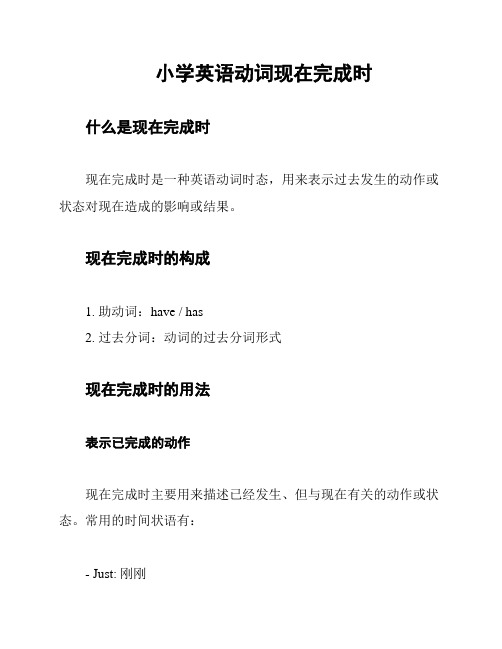
小学英语动词现在完成时什么是现在完成时现在完成时是一种英语动词时态,用来表示过去发生的动作或状态对现在造成的影响或结果。
现在完成时的构成1. 助动词:have / has2. 过去分词:动词的过去分词形式现在完成时的用法表示已完成的动作现在完成时主要用来描述已经发生、但与现在有关的动作或状态。
常用的时间状语有:- Just: 刚刚- Yet: 还- Already: 已经- Ever: 曾经- Never: 从未- So far: 到目前为止- Recently: 最近- Lately: 最近例如:- I have just finished my homework.(我刚刚完成了作业。
)- Have you eaten breakfast yet?(你吃早饭了吗?)- They have already left for the airport.(他们已经去机场了。
)表示持续到现在的动作或状态现在完成时还可以用来表达一个动作或状态从过去开始一直延续到现在,强调对现在的影响或结果。
例如:- I have lived in this city for five years.(我已经在这个城市住了五年了。
)- We have known each other for a long time.(我们认识彼此已经很久了。
)注意事项1. 现在完成时与过去时态的区别在于现在完成时强调对现在的影响或结果,而过去时态则只描述过去的动作或状态。
2. 动词的过去分词形式可以通过动词原形加上-ed(大多数情况下)或者根据不规则动词的变化形式来构成过去分词。
希望以上内容对你理解小学英语动词现在完成时有所帮助。
小学六年重要知识点现在完成时与一般过去时的区别

小学六年重要知识点现在完成时与一般过去时的区别在小学六年级的英语学习中,现在完成时和一般过去时是两个重要的时态。
虽然它们都表示过去的动作或状态,但是在用法和含义上存在一些区别。
下面将详细介绍现在完成时和一般过去时的区别。
一、现在完成时的用法现在完成时表示过去发生的动作或已完成的状态与现在的关系。
它通常与包括"have"或"has"的助动词连用,并且当前仍有相关的影响或结果。
1. 表示过去发生的动作或已完成的状态对现在造成的影响或结果:- I have finished my homework.(我已经完成了我的作业。
)(现在,我没有作业要做了。
)- She has lost her key.(她已经丢失了她的钥匙。
)(现在,她无法打开门。
)2. 表示过去开始的动作一直延续到现在(或现在仍在进行):- They have lived in this city for three years.(他们在这个城市已经住了三年了。
)(他们仍然住在这个城市。
)二、一般过去时的用法一般过去时表示过去发生的动作或状态,与现在没有直接关系,对现在没有影响或结果。
1. 表示过去发生的动作或状态:- I finished my homework yesterday.(我昨天完成了我的作业。
)- She lost her key last week.(她上周丢失了她的钥匙。
)2. 表示过去的习惯或经常性动作:- They always played soccer after school.(他们放学后总是踢足球。
)三、现在完成时与一般过去时的区别1. 时间表达上的差异:- 现在完成时通常使用含有"have"或"has"的助动词,并结合表示过去的时间状语,如"just", "already", "yet"等。
现在完成时的概念与典型句型解析
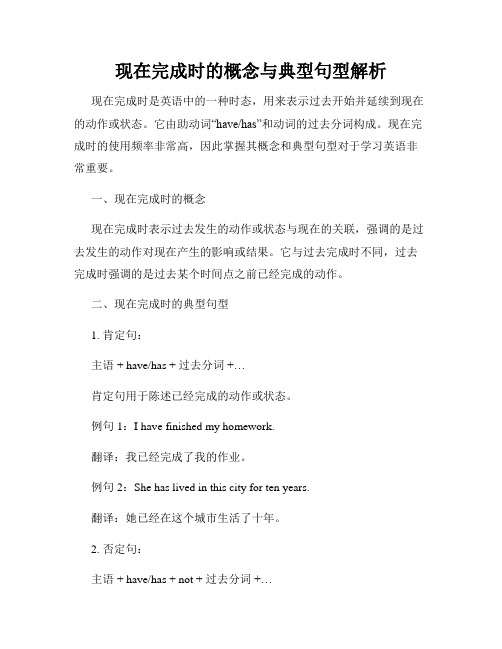
现在完成时的概念与典型句型解析现在完成时是英语中的一种时态,用来表示过去开始并延续到现在的动作或状态。
它由助动词“have/has”和动词的过去分词构成。
现在完成时的使用频率非常高,因此掌握其概念和典型句型对于学习英语非常重要。
一、现在完成时的概念现在完成时表示过去发生的动作或状态与现在的关联,强调的是过去发生的动作对现在产生的影响或结果。
它与过去完成时不同,过去完成时强调的是过去某个时间点之前已经完成的动作。
二、现在完成时的典型句型1. 肯定句:主语 + have/has + 过去分词+…肯定句用于陈述已经完成的动作或状态。
例句1:I have finished my homework.翻译:我已经完成了我的作业。
例句2:She has lived in this city for ten years.翻译:她已经在这个城市生活了十年。
2. 否定句:主语 + have/has + not + 过去分词+…否定句用于陈述尚未完成的动作或表达否定的状态。
例句1:I have not seen the movie yet.翻译:我还没有看过这部电影。
例句2:He has not finished his work.翻译:他还没有完成他的工作。
3. 疑问句:Have/Has + 主语 + 过去分词+… + ?疑问句用于询问是否已经完成或发生了某个动作或状态。
例句1:Have you ever been to London?翻译:你去过伦敦吗?例句2:Has she finished her presentation?翻译:她完成了她的演讲吗?4. 现在完成时与时间状语连用:现在完成时经常与时间状语连用,用于强调动作或状态的持续时间。
表示延续时间的时间状语:for + 时间段表示起始时间的时间状语:since + 完整时间点例句1:I have lived in this house for five years.翻译:我已经在这个房子里住了五年了。
现在完成时知识点总结

现在完成时知识点总结现在完成时是英语中表示过去发生的动作对现在造成影响的一种时态。
下面是现在完成时的一些重点知识点总结:1. 构成方式:现在完成时由“have/has + 过去分词”构成。
其中,have用于第一人称和第二人称,has用于第三人称单数。
2. 表示时间:现在完成时经常与表示过去的时间状语连用,如already(已经)、just(刚刚)、yet(还)、ever(曾经)、never(从未)、before(以前)等。
此外,它还可以与一些表过去体验和经历的副词连用,如recently(最近)、lately(最近)、so far(到目前为止)等。
3. 用法:(1)表示过去发生的动作对现在造成的影响或结果。
例句:I have finished my homework.(我已经完成了作业。
)例句:She has lost her key.(她丢了钥匙。
)(2)表示在过去某个不确定的时间内发生的动作或经历。
例句:I have been to Paris.(我曾去过巴黎。
)例句:Have you ever tried sushi?(你曾经尝试过寿司吗?)(3)表示刚刚完成的动作。
例句:The train has just arrived.(火车刚刚到了。
)例句:He has recently graduated from university.(他最近刚从大学毕业。
)4. 注意事项:(1)现在完成时一般与与过去发生的动作或经历有关的时间状语连用。
如表示对过去的操作有明确的时间状语,则应使用一般过去时态,而不是现在完成时态。
例句:I went to New York three years ago.(三年前我去过纽约。
)(2)注意have/has与过去分词的搭配规则,以及特殊的过去分词形式。
以上是对现在完成时的知识点总结,请在研究和运用过程中多加练,以熟练掌握该时态的用法和构成方式。
参考资料:。
小学现在完成时讲解

小学现在完成时讲解现在完成时是英语中的一种时态,表示动作或状态开始于过去,延续至现在,常常与现在的结果或影响相联系。
在小学英语教学中,学生需要掌握现在完成时的基本用法和构成规则。
用法现在完成时可以用来描述以下几种情况:1. 描述已经完成的动作:此时,动作发生在过去,但与现在仍然有关联。
例如:“I have finished my homework.”(我已经完成了作业。
)2. 表示经验或经历:使用现在完成时可以描述个人的经验或经历,强调的是过去至今的经历对现在的影响。
例如:“I have lived in China for five years.”(我在中国居住了五年。
)3. 现在的结果或影响:现在完成时可以用来表示过去的动作或事件对现在产生的结果或影响。
例如:“I have lost my keys, so I can't open the door.”(我丢了我的钥匙,所以无法打开门。
)构成规则现在完成时的构成通常由"have/has + 过去分词"组成。
其中,have用于第一人称和第二人称,has用于第三人称单数。
对于规则动词而言,过去分词通常是动词的过去式加上-ed结尾。
例如:- I have played soccer with my friends.(我和朋友们一起踢过足球。
)- He has studied English for two years.(他已经研究英语两年了。
)对于不规则动词而言,过去分词的形式需要根据具体动词进行记忆。
例如:- I have eaten lunch.(我吃过午饭了。
)- She has written a letter.(她写过一封信。
)注意事项使用现在完成时时,需要注意以下几点:1. 此时态通常与表达过去的时间状语连用,如“today, this week, in the morning”等。
例如:“I have visited my grandparents this week.”(我这个星期去看望了我的祖父母。
小学五年级英语上册《16种时态》归纳,收藏学习

五年级英语上册《16种时态》归纳,收藏学习1.一般现在时: do/does(普遍情况下都这样)He talks to his friends.他和他的朋友们说话。
2.现在进行时: am/is/are doingHe is talking to his friends.他正在和他的朋友们说话。
3. 现在完成时: have/has done(具有影响,说过了就不用再说了)He has talked to his friends.他已经和他的朋友们说过话了。
4.现在完成进行时:have/has been doing (还在继续)He has been talking to his friends.他一直和他朋友们在说话。
5. 一般过去时: did-(过去发生的事情)He talked to his friends.他和他的朋友们说完话了。
6.过去进行时: was/were doing (过去正进行,强调过去事情的过程)He was talking to his friends.他过去正在和他的朋友们说话。
7. 过去完成时: had done(具有影响的、过去发生的)He had talked to his friends.他和他的朋友们那时已经说过话了。
8.过去完成进行时:had been doingHe had been talking to his friends.他那时一直和他朋友们在说话。
9.过去将来时: would doHe would talk to his friends.他那个时候将会和他的朋友们说话。
10.过去将来进行时: would be doingHe would be talking to his friends.他那个时候将会和他的朋友们一直聊。
11.过去将来完成时: would have done (却没有说)He would have talked to his friends.他那时本会和他朋友们说的。
小学英语动词知识点总结

小学英语动词知识点总结一、动词的时态1. 现在时:表示当前的状态或习惯性的动作,有一般现在时、现在进行时和现在完成时。
eg: He lives in New York. (一般现在时)She is reading a book. (现在进行时)They have finished their homework. (现在完成时)2. 过去时:表示过去发生的动作或状态,有一般过去时、过去进行时和过去完成时。
eg: He worked in a factory last year. (一般过去时)She was washing her hands when I called her. (过去进行时)They had already left when we arrived. (过去完成时)3. 将来时:表示将要发生的动作或状态,有一般将来时和将来进行时。
eg: He will go to the park tomorrow. (一般将来时)She is going to visit her grandparents next weekend. (将来进行时)4. 现在完成时:表示过去某个时间点开始,一直持续到现在的动作或状态。
eg: I have lived in this city for ten years.5. 过去完成时:表示在过去某个时间点之前已经完成的动作或状态。
eg: They had studied English for three years before they went to the UK.6. 被动语态:表示主语是动作的接受者,而不是执行者。
eg: The car was repaired by the mechanic.二、动词的时态也会被表示方式:1. 一般式:表示一般的动作或状态。
eg: She plays the piano every evening.2. 进行式:表示正在进行的动作。
现在完成时知识点归纳总结

现在完成时知识点归纳总结现在完成时是英语中一个重要的时态,用于表示过去发生的动作或事情对现在产生的影响或结果。
下面是对现在完成时的知识点进行归纳总结:一、现在完成时的构成现在完成时的构成由“助动词have/has + 过去分词形式的动词”组成,其中have用于第一人称(I, we)以及第二人称(you),has用于第三人称单数(he, she, it)。
1. 肯定句的构成:主语 + have/has + 过去分词形式的动词例如:- I have studied English for three years.- He has finished his homework.2. 否定句的构成:主语 + have/has + not + 过去分词形式的动词例如:- She hasn't visited London yet.- We haven't seen the movie.3. 疑问句的构成:Have/Has + 主语 + 过去分词形式的动词 + 其他?例如:- Have you ever traveled abroad?- Has she lived in this city before?二、现在完成时的用法1. 表示过去的行动或事件对现在的影响或结果。
例如:- She has lost her keys. (她现在找不到她的钥匙。
)- He has worked hard, so he is tired. (他过去努力工作,所以他现在很累。
)2. 表示从过去某个时间开始一直持续到现在的动作或状态。
例如:- They have lived in the same house for 10 years. (他们从10年前开始就一直住在同一栋房子里。
)- I have known him since we were kids. (我从我们还是孩子的时候就认识他了。
)3. 表示过去经历的事情或已经完成的动作。
《漫画图解——超好记超好用小学英语语法》第十八章 现在完成时

135第十八章 现在完成时 什么是现在完成时?现在完成时指的是过去发生并且已经完成的动作对现在造成影响或后果,过去某一时间开始并一直持续到现在并且有可能还会持续的动作或状态。
I have finished my homework. 我已完成了作业。
(这里的finished 就是动词finish 的过去分词。
)我们和动词过去式一起来记忆吧!变化规则动词原形动词过去式动词过去分词A —A —A 型cut cut cut put put put readread read set set set hurt hurt hurt let let let shut shut shut A —B —B 型bringbrought brought buy bought bought keep kept kept A —B —B 型build built built sendsent sent spend spent spent tell told told think thought thought teachtaughttaught136变化规则动词原形动词过去式动词过去分词A —B —B 型say said said meet met met make made made A —B —C 型begin began begun drink drank drunk sing sang sung ring rang rung blow blew blown fly flew flown draw drew drawn growgrew grown drive drove driven ride rode ridden break broke breaken freeze froze frozen forget forgot forgetten eat ate eaten fall fell fallen take took taken gowent gone A —A —B 型beat beat beaten A —B —A 型come came come become became become runranrunLinda 老师的小提醒☆ 情态动词没有过去分词。
小学英语现在完成时的基本用法和练习
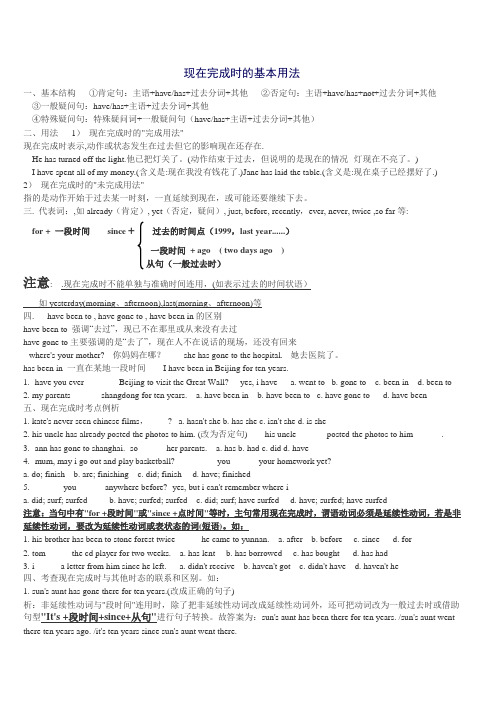
2. susan has been in this city for more than ten years.(改为同义句)________more than ten years ____susan ______to this city.英语的行为动词有持续性动词和瞬间性动词之分,使用中应注意两者的区别:一、持续性动词: 表示一个动作可以持续一段时间或更长时间。
常见的study, play, do, read, learn, drive, write, clean , sleep, speak, talk, wait, fly, stay, sit, stand, lie, keep等。
二、瞬间性动词: 表示一个动作发生在一瞬间,非常短暂。
亦称终止性动词。
常见的--begin, start, finish, go, come, leave, find, get up, arrive, reach, get to, enter, hear, stop, open, close, become, buy, borrow, lend, happen, join, lose, renew, die, take away, put up, set out, put on, get on/off等常用瞬间动词相应持续性动词关系:1、go—be away2、come—be here3、come back—be back4、leave—be away(be not here)5、buy—have6、borrow—keep7、die——be dead8、begin——be on9、finish—be over 10、open——be open 11、close——be closed 12. join—be in(…)或be a…member13.become—be现在完成时专项练习一、单项选择。
1、both his parents look sad. maybe they _______what’s happened to him .a. knew b. have known c. must know d. will know2、he has _______ been to shanghai, has he?a. already b. never c. ever d. still3、have you met mr. li ______?a. just b. ago c.before d.a moment ago4、the famous writer ____ one new book in the past two year .a. is writing b.was writing c.wrote d.has written5、—our country ______ a lot so far .—yes. i hope it will be even ______.a. has changed ; well b. changed; goodc. has changed ; better d. changed; better6、zhao lan ______already ______in this school for two years .a. was; studying b. will; studyc. has; studied d. are; studying7、we ______ xiao li since she was a little girl . a. know b. had known c. have known d. knew8、harry potter is a very nice film. i_______ it twice .a. will see b. have seen c. saw d.see9、—these farmers have been to the united states . —really? when _____ there?a. will they go b. did they go c. do they go d. have they gone10、—______ you ___ your homework yet ? —yes. i _____ it a moment ago.a. did; do; finished b. have; done; finishedc. have; done; have finished d.will; do; finish11、his father _____ the party since 1978 .a. joined b. has joined c. was in d. has been in12、—do you know him well ? —sure .we _________ friends since ten years ago .a. were b. have been c. have become d. have made13、—how long have you ____ here ?—about two months.a. been b. gone c. come d. Arrived14、hurry up! the play _____ for ten minutes. a. has begun b. had begun c. has been on d. began15、it _____ ten years since he left the army .a. is b. has c. will d. was16、miss green isn't in the office. she _______ to the library.a. has gone b. went c.will go d. has been17、my parents ______ shandong for ten years.a. have been in b. have been to c. have gone to d. have been18、the students have cleaned the classroom, _______ ?a. so theyb. don’t theyc. have theyd. haven’t they19、________ has mr white been a member of greener china since he______ to china?a. how soon, comesb. how often, gotc. how long, camed. how far, arrived20、his uncle_________ for more than 9 years.a. has come hereb. has started to workc. has lived thered. has left the university二、句型转换。
现在完成时小学英语练习题

现在完成时小学英语练习题现在完成时是英语时态中的一种,用来描述过去发生的动作对现在造成的影响或结果,或者过去开始、持续到现在的动作或状态。
以下是一些适合小学英语水平的现在完成时练习题,帮助学生巩固和理解这一时态。
一、选择题1. She _______ her homework already.A. finishesB. finishedC. has finished2. They _______ to the museum last week.A. wentB. goC. have gone3. I _______ my book for two hours.A. readB. am readingC. have been reading答案: C, C, C二、填空题4. My father _______ (work) in this company for ten years.5. The children _______ (play) in the park since this morning.6. We _______ (not see) our grandparents for a long time.答案: has worked, have been playing, haven't seen三、改写句子7. The cat has eaten all the fish. (改为一般疑问句)- Has the cat eaten all the fish?8. They have visited many places in the world. (改为否定句)- They haven't visited many places in the world.9. She has finished her homework. (改为一般疑问句并否定回答)- Has she finished her homework?- No, she hasn't.四、用所给词的适当形式填空10. I _______ (never/see) this movie before.11. He _______ (just/arrive) at the airport.12. _______ (you/already/eat) your lunch?答案: have never seen, has just arrived, Have you already eaten五、翻译句子13. 他昨天去了图书馆。
最新人教版小学英语语法--时态总结
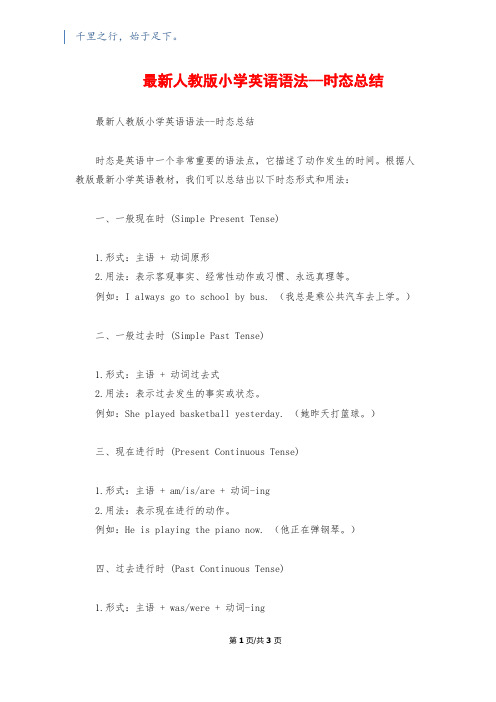
千里之行,始于足下。
最新人教版小学英语语法--时态总结最新人教版小学英语语法--时态总结时态是英语中一个非常重要的语法点,它描述了动作发生的时间。
根据人教版最新小学英语教材,我们可以总结出以下时态形式和用法:一、一般现在时 (Simple Present Tense)1.形式:主语 + 动词原形2.用法:表示客观事实、经常性动作或习惯、永远真理等。
例如:I always go to school by bus. (我总是乘公共汽车去上学。
)二、一般过去时 (Simple Past Tense)1.形式:主语 + 动词过去式2.用法:表示过去发生的事实或状态。
例如:She played basketball yesterday. (她昨天打篮球。
)三、现在进行时 (Present Continuous Tense)1.形式:主语 + am/is/are + 动词-ing2.用法:表示现在进行的动作。
例如:He is playing the piano now. (他正在弹钢琴。
)四、过去进行时 (Past Continuous Tense)1.形式:主语 + was/were + 动词-ing第1页/共3页锲而不舍,金石可镂。
2.用法:表示过去某个时间正在进行的动作。
例如:They were swimming in the pool yesterday. (他们昨天在游泳池里游泳。
)五、将来时 (Future Tense)1.形式:主语 + will + 动词原形2.用法:表示将来要发生的动作。
例如:We will have a picnic tomorrow. (我们明天去野餐。
)六、现在完成时 (Present Perfect Tense)1.形式:主语 + have/has + 过去分词2.用法:表示过去发生的动作对现在造成的影响。
例如:He has finished his homework. (他完成了他的作业。
小学英语语法专项《现在完成时》练习附解析答案
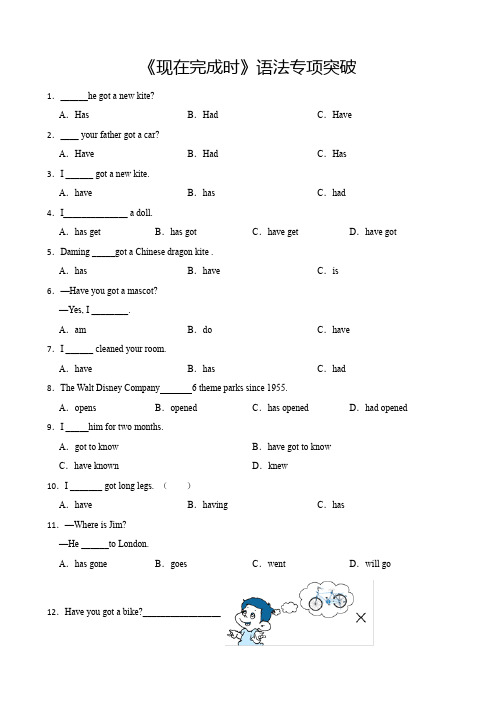
《现在完成时》语法专项突破1.______he got a new kite?A.Has B.Had C.Have2.____ your father got a car?A.Have B.Had C.Has3.I ______ got a new kite.A.have B.has C.had4.I______________ a doll.A.has get B.has got C.have get D.have got 5.Daming _____got a Chinese dragon kite .A.has B.have C.is6.—Have you got a mascot?—Yes, I ________.A.am B.do C.have7.I ______ cleaned your room.A.have B.has C.had8.The Walt Disney Company 6 theme parks since 1955.A.opens B.opened C.has opened D.had opened 9.I _____him for two months.A.got to know B.have got to knowC.have known D.knew10.I _______ got long legs. ()A.have B.having C.has 11.—Where is Jim?—He ______to London.A.has gone B.goes C.went D.will go 12.Have you got a bike?_________________A.Yes,I have.B.No,I haven't.13.I ______ you for a long time. Where _____ you_______?A.didn't see, did go B.didn't see, have goneC.haven't seen, have been D.haven't seen, have gone14.He ____ there already.A.arrives B.arrived C.has arrived D.has been 15.Look, Susan! What a beautiful dress my mother ________me!A.is buying B.has bought C.buys D.bought 16.The torch relay ______ an Olympic tradition since 1936.A.has been B.be C.is17.Look, someone ______a picture on the blackboard. How beautiful it looks!A.draws B.is drawing C.has drawn D.drew 18.He ______ his homework and now is listening to music.A.finished B.will finish C.has finished D.finish 19.She ____sad since you went away.A.has been B.is C.was D.had been 20.I ________in Beijing for half a year now.A.was B.have come C.had come D.have been 21.My brother ________a League member for three years.A.has been B.has become C.has joined D.was 22.—Have you got a yellow cap?—Yes,________ have.A.I B.she23.Look at the empty room. All the guests_________.A.are leaving B.left C.have left D.will leave 24.That's why you ______so worried in the last few days.A.are B.have been C.had been D.were 25.I ______ got a yellow sweater.A.have B.has C.had26.His hair ____ white these days.A.have turned B.are C.has turned D.will be 27.—Have you got a bag?—________________A.Yes, I have.B.No, I haven't.28.—How long _____the man_____?—For 4 years.A.has, died B.did, die C.was, died D.has, been dead 29.I at this school for about two months.A.am B.will be C.have been D.was30.He _______ his bike, he has to walk to school.A.lost B.loses C.has lost D.had lost 31.I _______ him since we last met in 1998.A.don't see B.haven't seen C.didn't see D.have seen 32.She ________ got red hair. ()A.am B.have C.has33.She _____got lots of picture books.A.is B.has C.have34.I _______ got brown hair. ()A.am B.have C.has35.______you made some friends?A.Does B.Did C.Have36.It _____ got a lovely cat on it.A.has B.is C.have37.My mother is a news reporter. She ________ a reporter for over 25 years.A.is B.had been C.will be D.has been 38.I _______ a letter from a friend.A.has got B.have got C.has get 39.New York ___________ more than eight million people.A.has got B.have got C.is40.It's ____eight million people.A.get B.got C.gets 41.Beijing _____ got 14million people.A.is B.have C.has 42.—Have you got a schoolbag?—______________A.Yes, I have.B.No, I have.C.Yes, I haven't. 43.—What toys have you got ?—I ____ some toy dogs .A.has got B.have got C.there is 44.My sister _______ got a doll.A.have B.has C.there45.I've ___ lots of stamps.A.get B.gets C.got46.Have you got a big one? Yes, I__________.A.haven't B.got C.have D.do 47.I have ______a new kite.A.buy B.bought C.buys 48.Your brother________ a new car.A.has got B.have got C.has get49.I have ____ fishing.A.go B.goes C.gone50.We have ________ lots of food.A.get B.got C.take答案解析部分1.A他有新风筝吗?本句主语是第三人称单数,助动词用单三形式,have got有,动词单三形式has got,过去式had got,故选A.2.C你的父亲有一辆小汽车吗?本句是现在完成时,主语是第三人称单数,谓语动词用单三形式,have got得到,动词原形,单三形式has got,过去式had got,故选C.3.A我……一个新风筝。
英语语法 现在完成时有哪些常见的例子
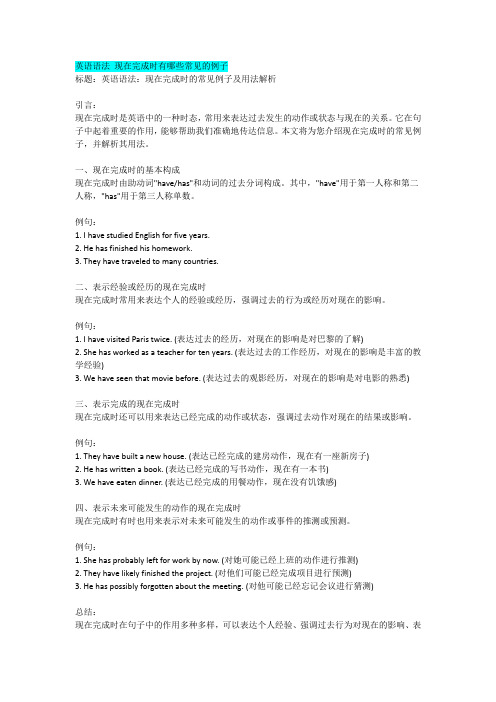
英语语法现在完成时有哪些常见的例子标题:英语语法:现在完成时的常见例子及用法解析引言:现在完成时是英语中的一种时态,常用来表达过去发生的动作或状态与现在的关系。
它在句子中起着重要的作用,能够帮助我们准确地传达信息。
本文将为您介绍现在完成时的常见例子,并解析其用法。
一、现在完成时的基本构成现在完成时由助动词"have/has"和动词的过去分词构成。
其中,"have"用于第一人称和第二人称,"has"用于第三人称单数。
例句:1. I have studied English for five years.2. He has finished his homework.3. They have traveled to many countries.二、表示经验或经历的现在完成时现在完成时常用来表达个人的经验或经历,强调过去的行为或经历对现在的影响。
例句:1. I have visited Paris twice. (表达过去的经历,对现在的影响是对巴黎的了解)2. She has worked as a teacher for ten years. (表达过去的工作经历,对现在的影响是丰富的教学经验)3. We have seen that movie before. (表达过去的观影经历,对现在的影响是对电影的熟悉)三、表示完成的现在完成时现在完成时还可以用来表达已经完成的动作或状态,强调过去动作对现在的结果或影响。
例句:1. They have built a new house. (表达已经完成的建房动作,现在有一座新房子)2. He has written a book. (表达已经完成的写书动作,现在有一本书)3. We have eaten dinner. (表达已经完成的用餐动作,现在没有饥饿感)四、表示未来可能发生的动作的现在完成时现在完成时有时也用来表示对未来可能发生的动作或事件的推测或预测。
小学英语时态和语法总结

小学英语时态和语法总结一、现在时态(Present Simple)1. 用法:表示经常性的动作、习惯、常态、真理等。
2. 构成:主语 + 动词原形(第三人称单数要加-s)3. 特殊用法:a) 认真、真诚的祈使句:Be satisfied with your life.b) 当现在是将来动作或安排:My plane leaves in one hour.c) 描述本能或内在特征:The earth moves around the sun.d) 当主语是it,后面是名词从句时:It seems that she knows the answer.e) 表示世界真理或普遍真理:The sun rises in the east.4. 注意事项:a) 第三人称单数动词要加-s。
b) 当主语是第一或第二人称,或者是复数,动词不变。
二、现在进行时态(Present Continuous)1. 用法:表示现在正在进行的动作。
2. 构成:主语 + am / is / are + 动词的现在分词(-ing形式)3. 特殊用法:a) 表示近期打算:I am going to the cinema tonight.b) 表示变化发展的情况:The weather is getting worse.c) 表示接下来安排好的未来动作:I am seeing a movie tomorrow.d) 表示抱怨或责备:You are always misbehaving!4. 注意事项:动词的现在分词的构成规则需要注意。
如:study - studying, play - playing, run - running。
第1页/共5页三、过去时态(Past Simple)1. 用法:表示过去发生的动作或状态。
2. 构成:主语 + 动词过去式3. 特殊用法:a) 表示“过去经常性的动作”:I often walked to school when I was young.b) 表示“在过去的某个时间发生的动作”:I visited my grandparents last weekend.c) 用于条件句中,表示假设:If I had enough money, I would buya car.4. 注意事项:动词的过去式需要根据规则进行变化,如:study - studied, play - played, run - ran。
现在完成时知识点

现在完成时知识点现在完成时是英语中的一种时态,用来描述已经发生的动作或已经完成的状态。
在现在完成时中,动词的形式由“have/has + 过去分词”构成。
下面将介绍现在完成时的相关知识点。
一、现在完成时的构成现在完成时的肯定句结构为:“主语+ have/has + 过去分词”。
其中,当主语为第一人称单数(I)时,使用have;当主语为第三人称单数(he/she/it)或复数时,使用has。
过去分词的构成方式有规则变化和不规则变化。
1. 规则变化的过去分词规则变化的过去分词是指动词的过去式和过去分词形式相同,通常在动词原形后加-ed。
如:play-played, work-worked。
2. 不规则变化的过去分词不规则变化的过去分词是指动词的过去式和过去分词形式不同,需要通过记忆。
如:go-gone, eat-eaten。
二、现在完成时的用法现在完成时主要用来表示过去发生的动作对现在造成的影响或结果。
具体用法如下:1. 表示过去发生的动作对现在造成的影响例如:- I have lost my keys.(我丢了钥匙。
)- She has broken her leg.(她摔断了腿。
)2. 表示过去已完成的动作对现在造成的结果例如:- They have finished their homework.(他们已经完成了作业。
)- He has bought a new car.(他买了一辆新车。
)3. 表示过去开始的动作一直持续到现在例如:- I have known her for five years.(我认识她已经五年了。
)- He has worked in this company since 2010.(他从2010年开始在这家公司工作。
)4. 表示过去发生的动作在过去某个时间点之前已经完成例如:- I had read the book before the movie came out.(在电影上映之前,我已经读过这本书了。
小学英语-现在完成时
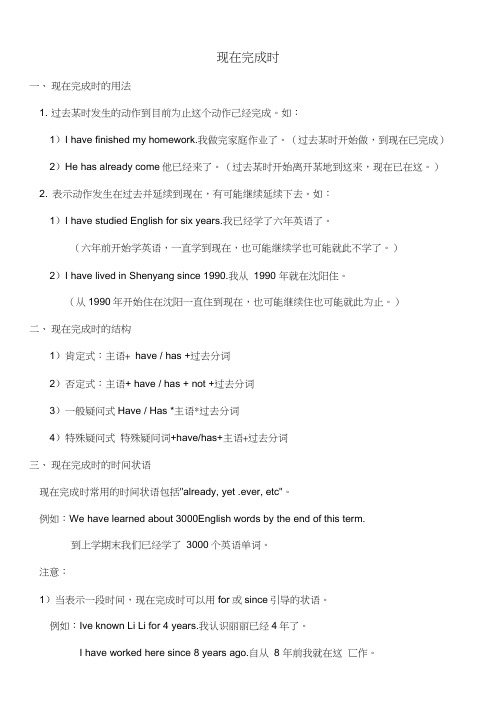
现在完成时一、现在完成时的用法1. 过去某时发生的动作到目前为止这个动作己经完成。
如:1)I have finished my homework.我做完家庭作业了。
(过去某时开始做,到现在已完成)2)H e has already come他已经来了。
(过去某时开始离开某地到这来,现在已在这。
)2. 表示动作发生在过去并延续到现在,有可能继续延续下去。
如:1)I have studied English for six years.我已经学了六年英语了。
(六年前开始学英语,一直学到现在,也可能继续学也可能就此不学了。
)2)I have lived in Shenyang since 1990.我从1990 年就在沈阳住。
(从1990年开始住在沈阳一直住到现在,也可能继续住也可能就此为止。
)二、现在完成时的结构1)肯定式:主语+ have / has +过去分词2)否定式:主语+ have / has + not +过去分词3)一般疑问式Have / Has *主语*过去分词4)特殊疑问式特殊疑问词+have/has+主语+过去分词三、现在完成时的时间状语现在完成时常用的时间状语包括"already, yet .ever, etc"。
例如:We have learned about 3000English words by the end of this term.到上学期末我们已经学了3000个英语单词。
注意:1)当表示一段时间,现在完成时可以用for或since引导的状语。
例如:Ive known Li Li for 4 years.我认识丽丽已经4年了。
I have worked here since 8 years ago.自从8 年前我就在这匸作。
2)当在肯定陈述句中含有already或just时,在转换成否定句时,要把句中的already或just 去掉,在句末加上yet,f列女口:I have already seen the film. ----- I haven't seen the film yet.He has just come. -------- He hasn't come yet.四、使用时注意事项1. M have/ has got M形式上是一种完成时,但和have/ has为同一意思”有"。
- 1、下载文档前请自行甄别文档内容的完整性,平台不提供额外的编辑、内容补充、找答案等附加服务。
- 2、"仅部分预览"的文档,不可在线预览部分如存在完整性等问题,可反馈申请退款(可完整预览的文档不适用该条件!)。
- 3、如文档侵犯您的权益,请联系客服反馈,我们会尽快为您处理(人工客服工作时间:9:00-18:30)。
新概念英语语法串讲——现在完成时
现在完成时指的是过去发生并且已经完成的动作对现在造成影响或后果,过去某一时间开始并一直持续到现在并且有可能还会持续的动作或状态。
一、现在完成时的用法
1.过去某时发生的动作到目前为止这个动作已经完成。
如:
1
2.
1
2
1
2
3
4
现在完成时常用的时间状语包括“already,yet,ever,etc”。
例如:Wehavelearnedabout3000Englishwordsbytheendofthisterm.
到上学期末我们已经学了3000个英语单词。
注意:
1)当表示一段时间,现在完成时可以用for或since引导的状语。
例如:I’veknownLiLifor4years.我认识丽丽已经4年了。
Ihaveworkedheresince8yearsago.自从8年前我就在这工作。
2)当在肯定陈述句中含有already或just时,在转换成否定句时,要把句中的already或just
去掉,在句末加上yet.。
①for+
②
③
④
⑤Itis+
1
(1)一般动词,在词尾直接加“ed”。
work---worked---worked,visit---visited---visited ??
(2)以“e”结尾的动词,只在词尾加“d”。
live---lived---lived,
(3)以“辅音字母+y”结尾的动词,将"y"变为"i",再加“ed”。
study---studied---studied,cry---cried---cried
(4)重读闭音节结尾,末尾只有一个辅音字母,先双写该辅音字母,再加“ed”。
stop---stopped---stopped,drop---dropped--dropped
2、不规则动词变化需参看不规则动词表逐一熟记。
例如;cut-cut-cut,hit--?hit--hit.
五、使用时注意事项
1.“have/hasgot”形式上是一种完成时,但和have/has为同一意思“有”。
例如:Haveyougotpen-friends?Yes,Ihave.
─Yes,he’sbeentheremanytimes.是的,他去过好几次了。
─Wherehavetheygone?他们去哪里了?
─They’vegonetoShenyang.他们去沈阳了。
4.非延续性动词(或称作终止性动词)不能用“现在完成时+表示一段时间的状语”的句型中。
?这类动词有:come,go,start,leave,die,buy,finish,join,borrow,stop等。
但它们能够用表
示持续状态的相应的延续性动词替换句中的终止性动词。
arrive,come→behere,beinbuy→have
begin,start→beon die→bedead
getup→beupleave,move→beaway;
goout→beoutborrow→keep
解析”,表示
均为瞬答案
典型例题2:—______you___your?homework?yet??
—Yes.I_____?it?a?moment?ago.
A.Did;do;finished
B.Have;done;finished???
C.Have;done;havefinished?
解析:本题考查一般过去时和现在完成时的用法区别。
问句中的yet表明应该用现在完成时,而回答中的a?moment?ago是一个表示过去的时间状语,应该用一般过去时。
答案:B
附表:动词——过去式——过去分词
1、AAA型(原形、过去式和过去分词同形):
cost?cost?costcut?cut?cutlet??let??let?
put?putput?read?read??read
2、ABB型(过去式与过去分词同形):
bring??brought??broughtbuildbuilt????built buybought??bought?catch???caught???caught digdugdug??feel?????felt?felt
※
3、
showshowedshownsing?sang?sung speakspokespokenswim?swam??swum taketook???taken???throw????threw?????thrown wakewokewoken??wearwore???worn writewrotewritten
4、ABA型(原形与过去分词同形):becomebecame?????becomecome??????camecome
5、AAB型(原形与过去式同形):
beatbeat??beaten
现在完成时练习
一、选择填空
1.Kate’sneverseenChinesefilms,____?
A.hasn’tshe
B.hasshe
C.isn’tshe
D.isshe
2.-Mum,mayIgooutandplaybasketball?
A.lost
B.don’tlose
C.havelost
D.iscoming
9.–WhereisMrLiu?-He________thelibrary.
A.hasbeento
B.hasgoneto
C.hasbeenin
D.haswent
10.WecametoShanghaithreeyearsago,sowe_______herefortwoyears.
A.havebeento
B.havebeenin
C.havebeen
D.havegone
11.-Howlong_______you_______yourexampaper?-Aboutthreemonths.
A.did;buy
B.have;get
C.have;had
D.have;bought
12.Hetellsmehe________Chinaforovereightyears.
A.hasbeen
B.hasbeenin
C.hasbeento
D.hasgoneto
13.Hisparents________formorethan3years.
Array 14.
A.
15.
A
16.
17.
18.
19.—Ihavewatchedthegame.—When_______you_______it?
A.have;watchedB.do;watchC.did;watchD.will;watch 20.MissBrown_______totheGreatWalltwice.A.havebeenB.hasbeenC.havegoneD.hasgone
二.用动词的适当形式填空
1.I___________already_________(see)thefilm.I_____________(see)itlastweek.
2.—___________he___________(finish)hisworkyet? —Notyet.
3.—___________you___________(be)toHongKong?
—Yes,I____________(be)theretwice.
4.—___________youever____________(eat)chocolate? —No,never.
5.
5.WebegantolearnEnglishthreeyearsago.(改为同义句)
We______________________English_____________threeyears.
四.填入has/havebeen或has/havegone.
1.Harry:IsawyouinAnnabel'sRestaurantlastnight.
Diana:No,itwasn'tme.I____________never__________there.
2.Sam:SallyandTimareonholiday,aren'tthey?Where________they__________? Sue: ToFlorida,again.
Sam:Howmanytimes________they___________there?
Sue:Thisistheirthirdvisit.
3.Steve:CanIspeaktoJill,please?。
